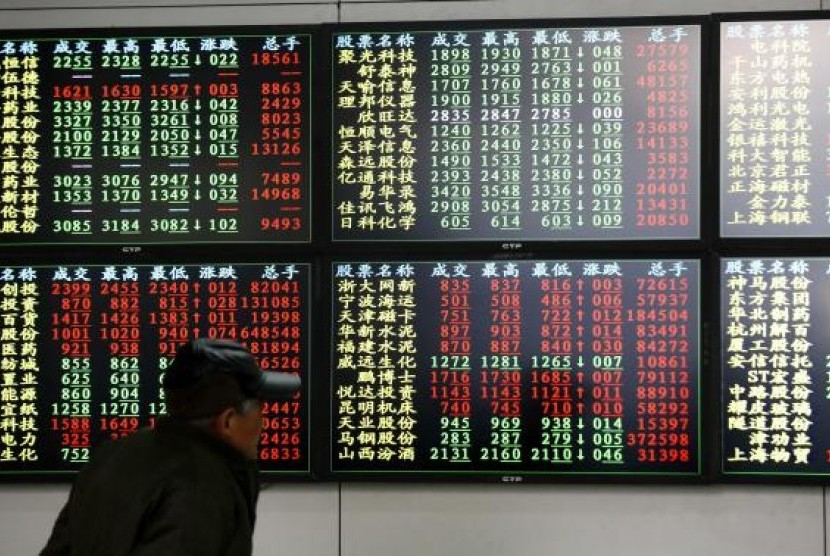REPUBLIKA.CO.ID, LONDON -- Oil prices touched fresh 5-1/2-year lows on Monday, spurring an emerging market selloff as demand for the safe-haven yen picked up while European stocks stabilised after their worst week since 2011.
Oil prices touched fresh 5-1/2-year lows on Monday, spurring an emerging market selloff as demand for the safe-haven yen picked up while European stocks stabilised after their worst week since 2011.
Indonesia's rupiah sank to a six-year trough and Russia's rouble hit record lows. Emerging stocks fell to nine-month lows .MSCIEF and developing market dollar bond yield premiums over US Treasuries were at their highest since 2011 11EML.
Investors were nervous after US stocks posted their biggest weekly fall in 2-1/2-years last week as the focus turns to the US Federal Reserve, which is expected to hint this week it is getting closer to raising interest rates.
US crude futures CLc1 fell more than 2.5 percent at one point to as low as 56.25 USD per barrel CLc1 before rising back into positive territory. They were last up 1.0 percent at 58.40 but have fallen more than 40 percent this year.
"The template is still in place: over-supply and dwindling demand mean that the pressure will still be on oil. However, there's a lot of pessimism over the oil price which has already been factored into the equity market," Alastair McCaig, market analyst at IG, said.
The world's energy watchdog late last week forecast even lower oil prices next year on weaker demand and increased supply, sparking fresh selling in Asia.
MSCI's broadest index of Asia-Pacific shares outside Japan .MIAPJ0000PUS fell to its lowest level since March at one point, and last stood down 0.8 percent.
Japan's Nikkei share average .N225 fell 1.6 percent, drawing little momentum from Japanese Prime Minister Shinzo Abe's big election victory on Sunday, which was a boost for his reflationary economic policies.
European shares edged up after suffering their biggest weekly loss in more than three years last week as Brent prices edged off their lows. The pan-European FTSEurofirst 300 index .FTEU3 rose 0.1 percent to 1,323.19 points.
Red Focus
The volatility in global risk assets is supporting demand for government debt and other traditional safe havens such as the Japanese yen, which rose as markets shrugged off Abe's election victory.
The dollar briefly fell to as low as 117.78 yen JPY= before recovering to 118.38 yen JPY=. It remained above a two-week low of 117.44 yen touched last Thursday, but far from the seven-year high of 121.86 yen set one week ago.
The euro remained on the defensive as euro zone inflation expectations hit a new low on Friday, raising prospects of more aggressive European Central Bank policy easing.
The single currency was down around a third of a percent against the yen at 147.27 yen EURJPY=, and down 0.2 percent against the dollar at 1.2435 USD.
The divergence in policy between the US and euro zone central banks is being accentuated by improving US economic data which has added to bets that the Fed is moving closer to raising interest rates next year.
Many investors believe the Fed may change its promise to keep interest rates near zero for a "considerable time" at its two-day policy meeting starting on Tuesday.
"There’s a focus on the Fed – the market is thinking about oil, but the medium term will be more dependent on monetary policy and not market volatility," said Josh O'Byrne, G10 currency strategist at Citi in London.
"Into year-end though, there is some incentive to close positions and perhaps there is a shorter threshold for pain."


